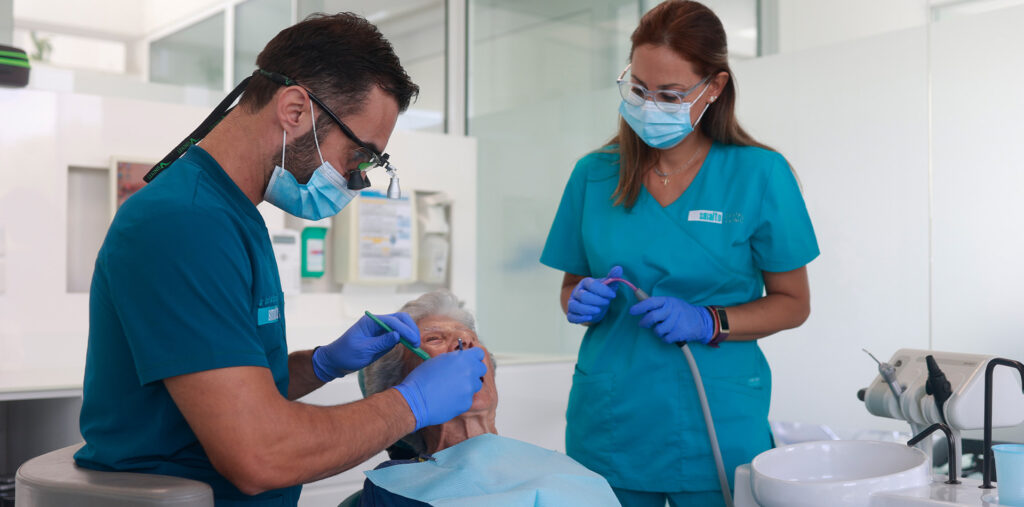Home / Dental Treatments / Periodontics
Periodontics
Are your gums bleeding every time you brush your teeth? Have they become inflamed and ‘puffy’ recently? Do you feel uncomfortable when eating because of increased sensitivity of your gums?
Then you may suffer from a type of periodontal disease. In this case, you should visit your local dentist as soon as possible if you want to save your teeth and enjoy optimal oral health.
In Nicosia, Cyprus, the expert dentist you’ve been looking for is part of Smalto Dental Clinic!
Our dental center features a team of dentists specialized in gum disease treatment. The sooner you come to us, the more possible it is for your oral problem to be treated with non-surgical techniques.
But if gum infection goes unnoticed or is left untreated, the bacteria gathered between your gums and your teeth will slowly destroy the underlying bone and damage the roots, leading to tooth loss.

Call us today and take the first step to a
healthier, more beautiful smile!

Periodontal or gum disease is an infection of the gums caused by poor oral hygiene and the accumulation of dental plaque and bacteria on the teeth and gums. Periodontal infections include gingivitis and periodontitis.
Gingivitis is the first stage of periodontal infection involving only the gums. The good news is that it is reversible and easy to treat. If left untreated, though, gingivitis can develop into periodontitis. Periodontitis is a severe bacterial infection that destroys the gums, bone and ligaments supporting the teeth.
Periodontal diseases progress silently, often without pain or symptoms, and can lead to tooth loss.
Luckily, an expert dentist with experience in periodontics can help. Periodontics is a specialized field of dentistry that focuses on the prevention, diagnosis, and treatment of diseases that affect the gums, bone, and periodontal ligament.
Treatment for periodontal diseases may include scaling and root planing, gum surgery, and bone grafting.
When bacteria stay on the teeth long enough, they form a film called plaque, which eventually hardens to tartar (calculus). Tartar build-up can spread below the gum line, which makes the teeth harder to clean and the gums to bleed. Here are the most common warning signs of gum disease:
Only a periodontist can remove the tartar and stop the gum disease before it leads to tooth loss.


Embracing good oral hygiene and being punctual with your dental cleaning appointment every six months are essential for the prevention of gingivitis. More severe cases of periodontal disease can be treated successfully, but may require more extensive surgical treatment.
Such treatment may include a deep cleaning of the tooth root surfaces below the gums, prescribed medication taken orally or placed directly under the gums, and sometimes corrective surgery.
To help prevent or control periodontal diseases, it is important to:


You should give special attention to how you clean your teeth and mouth, as this habit can be of the utmost importance for your dental hygiene.
Gingivitis is a marginal inflammation of the gingiva. It can be treated simply with a semi-annual dental cleaning appointment to remove plaque, tartar and stains, followed by good oral care at home.
Mild periodontitis is the next stage of gum infection that comes after gingivitis. In this case, the periodontist will perform deep cleaning of teeth, scaling and root planing of infected teeth (a careful cleaning of the root surfaces to remove plaque and calculus from deep periodontal pockets).
Periodontal surgery is necessary when severe periodontitis persists after non-surgical treatment. It aims to remove the bacteria and debris that have accumulated below the gum line and caused the infection.
A periodontist can perform four types of surgical treatments:
Periodontal surgery is typically used as a last resort when other non-surgical treatments, such as scaling and root planing, have failed to improve the condition.
If you are unsure about the health of your gums or teeth, call your expert local dentist at Smalto Dental Clinic in Nicosia to express your concerns and book an appointment for a thorough check-up. We would be happy to help you!

The rate at which gum disease spreads may depend on the severity of the disease, the patient’s oral hygiene habits, and overall health.
Gum disease can progress slowly over several months to years, or it can rapidly advance within a few weeks or months. If left untreated, gum disease can lead to tooth loss and other serious health complications.
It’s essential to practice good oral hygiene habits such as brushing your teeth at least twice a day, flossing, and visiting a dentist regularly for cleanings and checkups to prevent gum disease from spreading.
If you notice signs of gum disease, such as swollen or bleeding gums, it’s important to seek dental treatment as soon as possible to prevent the disease from progressing.
Don’t delay dental treatment: If your dentist recommends treatment for gum disease, don’t delay it, as the condition can progress and cause more damage to your teeth and gums.
The severity and extent of gum disease determine whether it can be reversed or not. Gingivitis, which is the earliest stage of gum disease, can typically be reversed with proper treatment and good oral hygiene practices.
However, if gum disease progresses to the more severe stage of periodontitis, it may not be entirely reversible. In advanced cases, the damage to the gums, teeth, and bones may be irreversible. The goal of treatment then may shift from reversing the disease to preventing further progression and maintaining oral health.
Even in advanced cases of periodontitis, proper treatment and ongoing maintenance can help manage the disease and prevent it from getting worse. This may include scaling and root planing, antibiotics, surgery, and other specialized treatments.
The ease with which gum disease can be fixed depends on the severity of the disease, how long it has been present, and how well the patient adheres to recommended treatment and oral hygiene practices.
In the early stage of gum disease, known as gingivitis, it is usually easy to fix with proper treatment and oral hygiene practices such as brushing, flossing, and regular professional cleanings.
However, if gum disease has progressed to the more advanced stage of periodontitis, the treatment may be more complex and involve specialized procedures such as scaling and root planing, gum grafting, or bone grafting.
There is limited research to suggest that coffee consumption may have potential advantages or disadvantages for gum disease.
Yet, adding sugar or sweeteners to coffee can contribute to the growth of bacteria in the mouth, which can lead to gum disease. Also, coffee can stain teeth, making spotting signs of gum disease more difficult.
Overall, moderate coffee consumption is unlikely to have a significant negative impact on gum health, especially if you practice good oral hygiene habits such as brushing and flossing regularly and visiting the dentist for checkups and cleanings.
If you have concerns about the effect of coffee on your oral health, it’s always best to talk to one of our expert dentists at Smalto Dental Clinic in Nicosia.
Not everyone who has gum disease will lose their teeth. However, if left untreated, gum disease can lead to tooth loss.
Gum disease is a progressive condition that starts with inflammation of the gums and can progress to the more severe stage of periodontitis. As the disease progresses, it can cause the gums to pull away from the teeth, forming pockets that become infected. The infection can damage the bone and tissues that support the teeth, causing them to become loose and eventually fall out.
The best way to prevent tooth loss from gum disease is to practice good oral hygiene habits, such as brushing, flossing, and visiting the dentist regularly for cleanings and checkups.
The only professional who can help you stop gum disease is a certified and experienced dentist.
Dentists are trained to identify the signs of gum disease and provide appropriate treatment. Treatment for gum disease may include deep cleaning procedures, such as scaling and root planing, to remove plaque and tartar buildup. Antibiotics and other specialized treatments may also be necessary in some cases.
In addition to providing treatment, dentists can educate their patients on good oral hygiene practices, such as proper brushing and flossing techniques, and the importance of regular dental checkups and cleanings.
Seek dental treatment immediately when you notice any signs of gum disease, such as swollen or bleeding gums, bad breath, or loose teeth. Early detection and treatment can help prevent further damage and save your teeth.
Your visit to Smalto starts with being greeted by friendly faces in a safe and welcoming environment designed to make you feel safe and relaxed. Our dentists are openly communicative and always happy to answer your questions. We are here to discuss your concerns and help you overcome your fear of dentists.